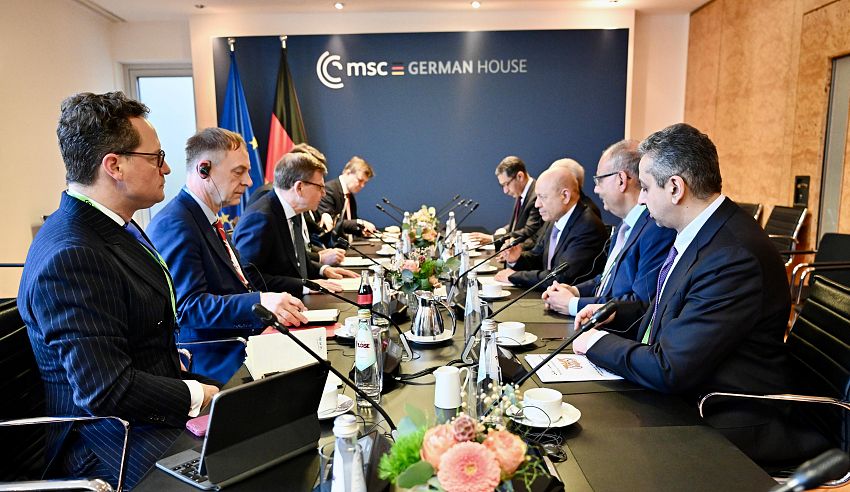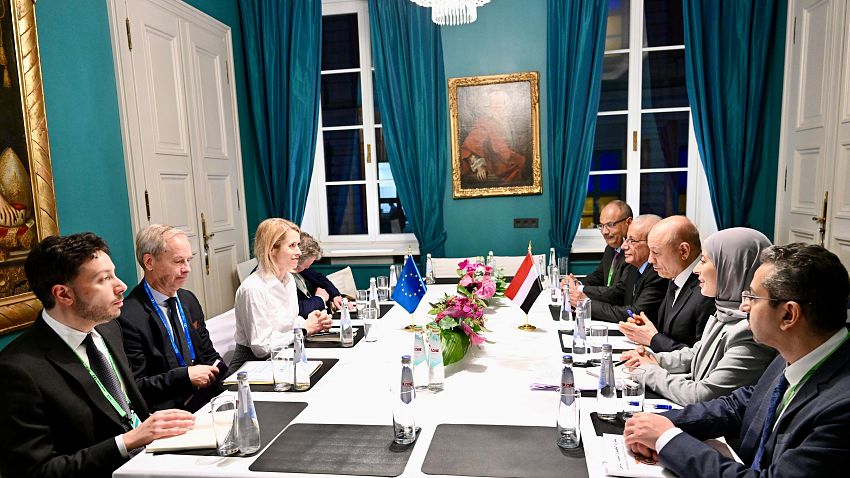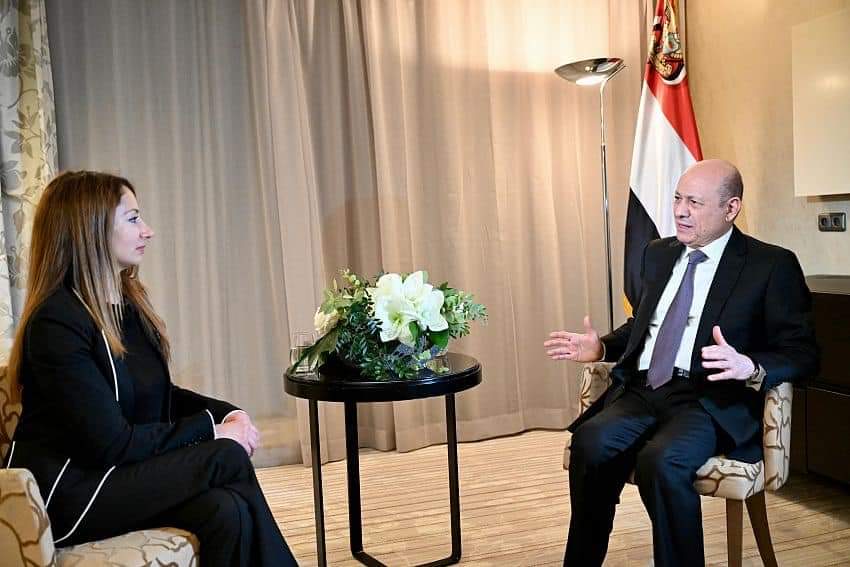
The full televised interview of His Excellency President Rashad Al-Alimi with Al-Arabiya channel
Munich
Interviewer: Dear viewers, welcome to this exclusive interview with His Excellency Rashad al- Alimi, President of Yemen,, whom we meet here in Munich on the sidelines of the Security Conference, where Yemen has been brought again into the international table mainly due to the Houthi militias’ threats to the international navigation.
Welcome , Your Excellency. Thank you for being here with us today .
President al- Alimi : Welcome
Interviewer: Let me start with what I have mentioned earlier in the introduction , and that is bringing back the Yemeni file into the international arena. Do you agree with me that maybe the only positive of the Houthi threats to navigation is bringing back the Yemeni file to the international stage after being absent for such a long time in reality ?
President al- Alimi : First of all, thank you so much for having me , and welcome Al Arabiya. Al Arabiya is one of the main TV channels that has supported the legitimate government and Yemeni people throughout the past period, especially under the control of the terrorist Houthi group over the State and its resources after the September’ coup in 2014.
Actually , there are many global issues nowadays , there are a lot of hotspots of tension and conflict around the world , and the emergence of a system or in other words the beginning of a multi-polar system has created many conflicts in many parts of the world . The Yemeni issue has been almost forgotten recently . Although there are international resolutions on the Houthi’s coup against the state and national consensus issued by the Security Council. most notably Resolution 2216, unfortunately , this and other resolutions have not been diligently implemented by the international community. In fact, many countries have even worked to disrupt efforts of the legitimate government and the Coalition to Support Legitimacy to end these militias’ control over the state and its institutions. Yemenis have faced such problem and paid dearly for that due to such disregard, lack of interest, or sometimes identifying with these militias. However, the situation has totally changed nowadays . The issue used to be viewed by the international community as merely political one , but it is not. The approach proposed by the international community , has finally today come to a consensus that political approaches to terrorist militias can never lead to results or stability, neither for Yemen nor for the region. Nowadays , the world is being affected by such terrorist attacks on international navigation.
Interviewer : Well, If it's not a political approach, what is it then ? a security approach?
President al- Alimi : Nowadays , the international community has taken a clear military approach because, unfortunately, political approaches do not work with these militias. We have been trying since 2011, to persuade this group to be a part of the political action , whether through the National Dialogue Conference, the Peace and Partnership Agreement, or through the following negotiations in different countries from Geneva to Berlin to Kuwait. However, such political approaches were only used by the Houthi terrorist militias as a station to rebuild their military capabilities and consequently carrying out new terrorist acts and attacks.
Interviewer : As you’ve just mentioned , it is truly a military approach. We have seen strikes carried out by Americans and the British against Houthi strongholds in Yemen, and this was something new. However, even after more than two weeks of those strikes, Houthis are still capable of carrying out attacks against international navigation, they continue to pose a threat to international navigation. In your opinion What militarily can be done more by Americans, British, and others against the Houthis,I mean more than what they are currently doing?
President al- Alimi : I believe the capabilities possessed by the Houthis will not be eliminated by those strikes. These capabilities may weaken, but will never be eliminated . Eliminating them comes through two things: first, partnership and support for the legitimate government to regain control over all the areas that have been controlled by this militia. The second thing is drying up sources of weapons coming from Iran over the past period, since there was a sort of identification and the ships carrying weapons to the Houthis were overlooked , in addition Resolution 2216 has not been implemented on Iran, who has not been complied with such resolutions and continued to transfer advanced weapons and equipment to Houthis over the last nine years and obviously even before that. Another thing can be done to eliminate Houthi capabilities is by putting this group under siege through political pressure and drying up their financial resources .
Interviewer : Let me just go back to the first part where you mentioned supporting the legitimate government in order to confront the Houthis. Do you mean military support and from whom? What form of support are you seeking from the International community to regain control over Houthi- controlled areas?
President al- Alimi : There are various forms of support. For example, at this very moment, UN organizations has been annually transferring funds , which are in billions, to their organizations in Sana'a. So far , international organizations are still in Sana'a, we have provided UN Secretary-General with a memoranda, additionally we called on the European Union to move these humanitarian organizations to Aden and transfer funds to the internationally recognized central bank. Because the cumulative amounts in Sana'a, whether the amounts added up after the facilities provided at the port or other amounts of money. Actually, many countries believed that such amounts of money would improve the humanitarian situation in Houthi-controlled areas, but it didn’t. On the contrary, it just got worse . Even goods in Houthi- controlled areas today are much more expensive than in government- controlled areas due to the levies imposed by these militias. Furthermore, in the legitimate government, we provide services to citizens, we pay salaries monthly to employees, while the Houthis, for almost nine years, hasn’t paid any salaries to employees, nor provided services to citizens . Instead, they use all the money they receive, whether from inside or outside the country , to enhance their military capabilities and increase their multiple attacks on Yemenis, whether on military fronts, cities, or vital facilities.
Interviewer : In regards to Iran, you mentioned the need for exerting more pressure on Iran because some are calling for military strikes on Iran as a way to pressure the Houthis. Do you believe or support such an approach or calls for military strikes within Iran ?
President al- Alimi : Regarding the military strikes on Iran, we believe that the real problem lies in Iran. There is a kind of race between two projects in the region: a race of destruction, war, and chaos, and a peace project peace, whether peace in Yemen, in Palestine, in Iraq, in Lebanon, or peace in Syria. There is a subversive Iranian project in the region, and a project led by the Kingdom of Saudi Arabia and other countries in the region, such as Egypt, the United Arab Emirates, Jordan, and other Arab countries, that support the Arab Peace Initiative. Iranians are against peace in Yemen, against peace in the region, against establishing a Palestinian state, and against self-determination for Palestinians. Just a few weeks ago, Ali Khamenei announced that he is against the cease fire in Gaza and against stopping attacks on international navigation in the Red Sea, and that’s exactly what he Iranian project is all about .
Interviewer : Okay, so do you worry that there might be a sort of international negotiations with the Houthis, maybe giving them certain benefits or maybe they will be recognized , in exchange for stopping their attacks on international navigation?
President al- Alimi : On the contrary, this even aggravates the problem. What is often referred to as feeding or clearly bribery, such feeding would fuel further extortion among terrorist organizations. over the past eight years ,The International Community, has only been trying to please , identify with, and adopt the Houthi militias as a political project. However, it turned out that these terrorist militias are now using the international community for making more gains. As a result , I bet this group will continue their terrorist acts, maybe today in the Red Sea, but after tomorrow or in a month, or a year somewhere else
The threats and attacks on the Red Sea have already started before the attacks on Gaza, I mean the Houthis and Iranians are investing the issue of Gaza unethically because nowadays Yemen is being besieged by the Houthis, for example Taiz is being besieged by the Houthis for almost eight years. Taiz is cut off water, food supplies, and it’s not even accessible to the public. More than 4 million Yemenis are being cut off everything they need for living. the legitimate government is being trapped in terms of exporting oil. Houthis have carried out attacks on oil ports, Houthis besiege Yemenis within the country , they exercise violence and terrorism against citizens, and yet they speak about the issue of Gaza and address it. This represents divergence between unethical practices and addressing ethical issues .
Interviewer : Recently, Houthis have been reclassified a terrorist organization by the U.S. How can you take advantage of such thing?, you’ve talked earlier about the need to cut off financial support to the Houthis and divert it to the legitimate authority. Do you think this is the first step towards achieving such thing ?
President al- Alimi: As for the classification , we have been calling for this classification a long time ago The United States had already listed the Houthis in the classification list, and it was higher in the rankings than the current one. It was a First Class Rating, whereas the current one is a softer second class rating . However, we believe such classification will not harm Yemenis. the proof of that is in the early stages of the war imposed by the terrorist militias against Yemenis between 2015 and 2016, the Port of Hodeidah was closed, so all goods and commodities were coming through the ports of Aden and Mukalla, then they were transferred to Houthi- controlled areas for a cheaper price than they are today. Nowadays , for example after facilities were provided to the port of Hodeidah, Houthis are receiving hundreds of millions of dollars from petroleum derivatives. According to the Stockholm Agreement, it was agreed that the port of Hodeidah would be a source for paying employees' salaries, but that didn’t happen at all. However , quite the opposite in the early stage of the Stockholm Agreement, there was $40 billion in the central bank in Hodeidah, which Houthis immediately confiscated and refused to implement the terms of the agreement. The Stockholm Agreement was a result of intense international pressure from all countries and the United Nations to end the battle for control of the port of Hodeidah, which has now become the port for receiving weapons, explosives, missiles, and drones coming from Iran to the Houthis.
Interviewer : Let me to ask you about your opinion on the agreement or the negotiations that took place between Houthis and Saudi Arabia. Do you think that Houthis may be relying more on tactics rather than a strategy when dealing with Saudi Arabia?
President al- Alimi : We have welcomed the efforts led by brotherly Kingdom of Saudi Arabia, and we have positively engaged with them in the Presidential Leadership Council. And now we are are taking steps to implement the roadmap. However, every day Houthis evade the peace process and come up with excuses. For example, I believe the terrorist attacks targeting the Red Sea and international navigation nowadays are one of their means to evade the peace process. We have been dealing with the Houthis for such a long time, they have never been committed to any agreement at all. Despite this, we believe that peace will be in the interest of Yemen. Peace serves Yemenis and alleviates their humanitarian suffering. Peace should be based on references, including UN Resolution 2216. Therefore, we are for peace, and the ball is in the militia’s court .
Interviewer : What guarantees would you require as a legitimate government for any kind of agreement or new negotiations you engage in with the Houthis? Who could be the guarantor that would compel the Houthis to stick to what is agreed? Could it be Iran?
President al- Alimi : The question is, does Iran want peace to ensure the peace process. The question should be asked in this way: We believe that Iran does not want peace, neither in Yemen nor in other countries . Therefore, we are not sure whether Iran wants to ensure the peace process. However, let us think well of Iran and say that Iran should halt the transfer of weapons and advanced equipment to the Houthis. Unfortunately, after the Saudi-Iranian de-escalation agreement in the entire region, international forces seized many vessels carrying various advanced weapons from Iran to the Houthis. The question arises then , Does this reflect the good intentions of Iran? Just about two weeks ago, a vessel carrying highly advanced weapons was seized , and Americans announced that two days ago. They announced that these shipments, included highly advanced weapons, such as submarines like boats that do not appear on the water's surface, and this is very serious. That’s why , we want Iran to prove by actions, not just by words, that it genuinely wants peace in Yemen and in the region. We have heard many voices , ,but actions speak louder.
Interviewer : Before we get to the end of the show , we can conclude that the political process is currently dead?
President al- Alimi: Peace should never die. For us Peace is life, and war is death. Houthis’s slogan is a death slogan. I mean this group does not believe in peace at all , and their slogan already starts with the word "death." So, what kind of peace can we expect from them? On the other hand , we still believe that peace is our only and one option . It is the way that will serve Yemeni people and achieve security and stability for the region, and for navigation in the Red Sea, Gulf of Aden, and the Arabian Sea.
Interviewer : Saudi Arabia can continue to play a role in Yemen, whether by providing economic support or political support. What do you think of the Saudi role over this period?
President al- Alimi : Saudi Arabia has always been supporting Yemeni people under all circumstances. Our relationship with Saudi Arabia is not just a passing one; it is a relationship rooted in history. We share more than 1,400 kilometers of long borders. We have about three million Yemeni expatriate laborers in Saudi Arabia. We also have 200,000 students in Saudi primary and secondary schools, I mean that’s a lot of people.
So in addition to the close ties of kinship, culture, religion, traditions and customs, ethics, and social and family bonds Saudi Arabia has always stood by Yemeni people under all circumstance. Whether in times of war or peace, in the past, present, and hopefully in the future, Saudi Arabia will continue to stand by Yemeni people’s side .
Interviewer : hope so , thank you so much, Mr. President, for this great interview .
President al- Alimi Thank you
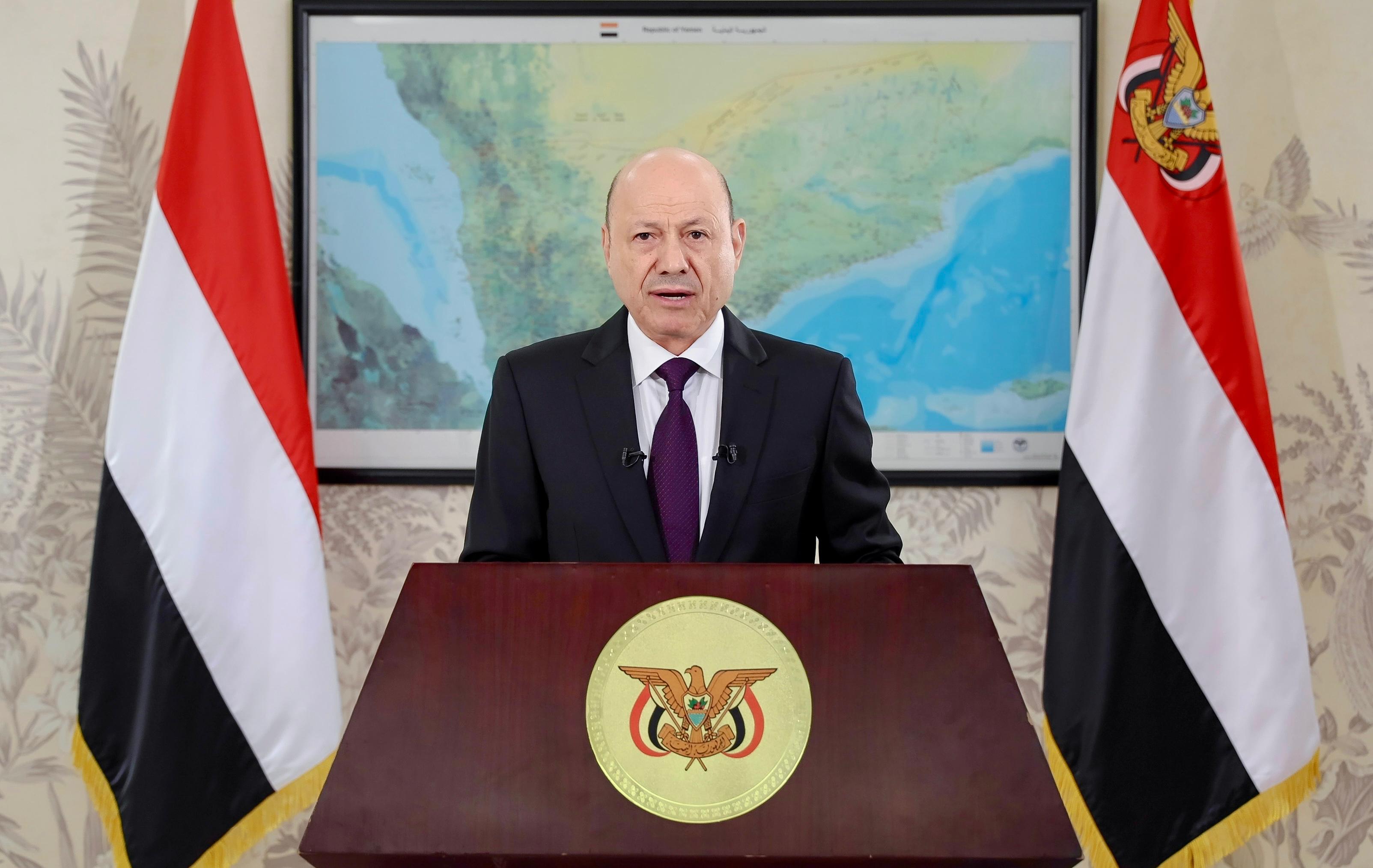
President Al-Alimi in Address to the Nation: Restoring Sana’a and a Just, Greater Yemen Will Remain a Collective National Goal
President of the Presidential Leadership Council, Dr. Rashad Mohammed Al-Alimi, called on the Yemeni people to seize the opportunity presented by the new transformations
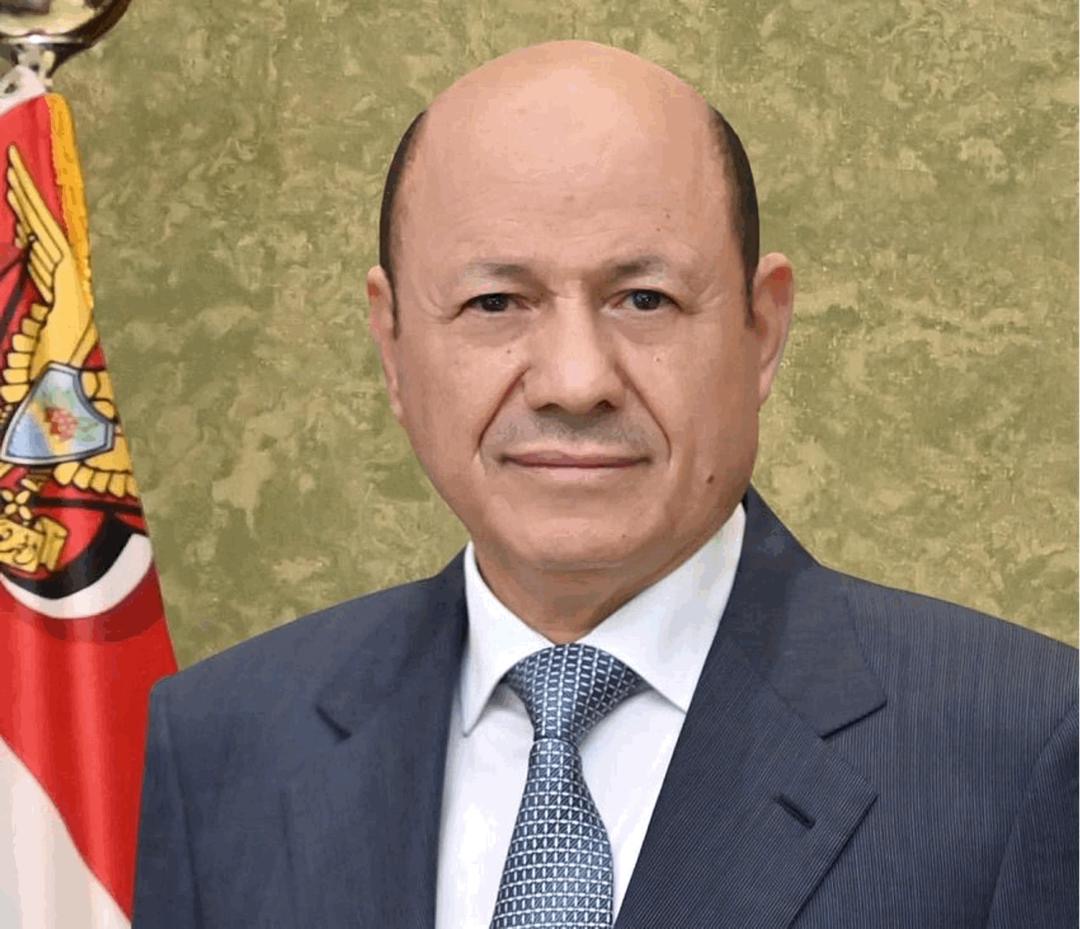
President Al-Alimi Exchanges Ramadan Greetings with Arab and Islamic Leaders
Tue ، 17 Feb 2026 09:06
